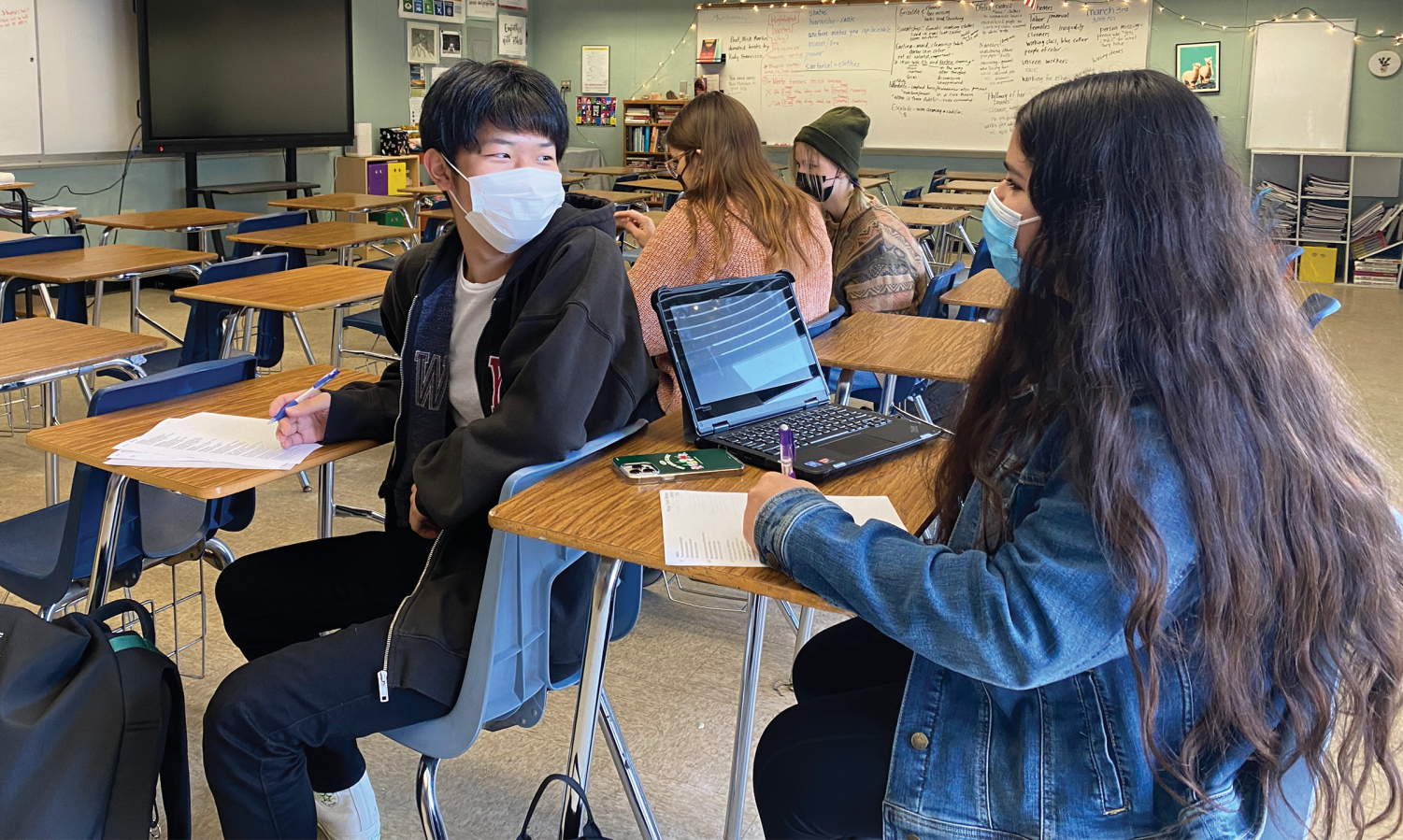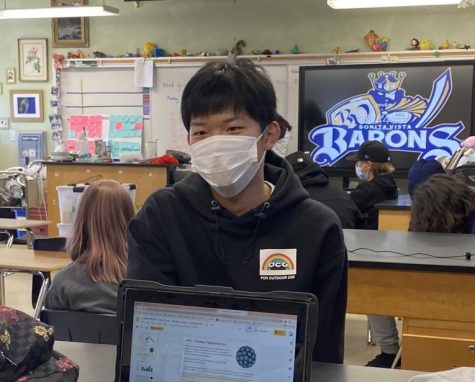Around the world
Expanding cultural horizons through foreign exchange
March 27, 2022
Foreign language classes foster an understanding of various cultures and expand a student’s perception of the world. Bonita Vista High (BVH) offers an exchange program that allows its students to travel through their foreign language classes—Italian, French, and Spanish. For many years, BVH language teachers have and are continuing to organize these exchanges because of the valuable experiences. Unfortunately, for these teachers, the district tends to ‘overlook’ the importance of these exchanges. The language teachers long for more assistance from the district in the planning of future exchanges. These teachers can only hope for more support in the arrangement aspect of things.
The exchange program itself provides students the opportunity to live with a host family for two weeks, where they learn to adjust to life in another country. On the other side of the exchange, students from their respective countries come to America to study at BVH and stay with their host families. Just this year, BVH welcomed five Japanese delegates. Though COVID-19 has been an obstacle for exchanges to happen, the program continues to hold activities through virtual meetings. All in all, the foreign exchange program at BVH is an essential experience for students who have a passion for the foreign language they are pursuing.
Travel through foreign language classes
For three to four years, students choose to take a foreign language class in an effort to study the history, culture, and cuisine of countries across the world. Beyond that, Bonita Vista High (BVH) provides its students with the opportunity to experience life in these countries from beyond the textbook, as the French, Italian and Spanish courses organize foreign exchange programs. Before COVID-19, students would travel to France, Italy or Spain and live with a host family for approximately two weeks. After, the foreign student host comes to BVH and lives with their own host family.
The language teachers have an agreement with schools from their respective languages. International Baccalaureate (IB) French teachers Marina Dillingham and Patrick Beaulieu visit the Institut de Genech in Lille, France, while Advanced Placement (AP) and IB Italian teacher Robert Pirazzini visits Liceo Statale Angela Veronese in Montebelluna, Italy. Dillingham reached out to the Institut de Genech 15 years ago when she first began to organize these exchanges.
“In the rest of the world, this kind of opportunity is not just encouraged, it is sought out in an incredible way, which is why we have schools hosting us because they are desperate to host us and to come here,” Dillingham said.
Senior Vanessa Ramirez was part of the last French student exchange in the fall of 2019 before the pandemic. She studied at the Institut de Genech. Her trip consisted of living with her host family until the last two days of her trip which were used to sightsee in Paris.
“[The exchange programs are] an extremely valuable experience. Even if you’re worried you don’t know the language that well, it’s still a great way to learn the language,” Ramirez said. “It’s extremely helpful, I learned way more French when I was there.”
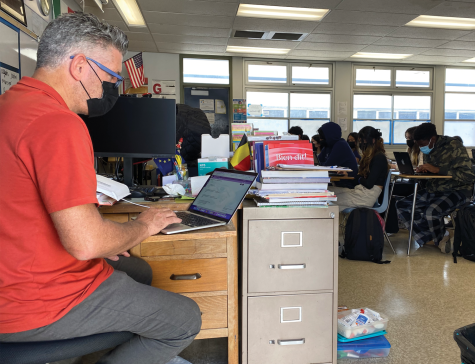
While staying with her host family, Ramirez’s days primarily consisted of going to school. She recounts being impressed by a particular advanced math class that her host student took and was shocked at how students spend their time after school in France.
“[Smoking] was definitely normalized. Also, going out to drink wine and having brunches and dinners right after school. That’s what they would be doing after or even during school because the hours are really different there. It was strange, but that was super normal for them,” Ramirez said.
Similarly, AP Italian student and senior Yarenni Hernandez visited Italy through a separate exchange program during the summer of 2021. Hernandez began learning Italian her freshman year and now sees Pirazzini twice a day; one time as a student and the other as a student aide.
Hernandez went through the Community Information Exchange (CIE) program which is one of many study abroad programs. Her original destination, the Dominican Republic, was canceled because of COVID-19 precautions, and out of many second choices, Hernandez decided to go to Rome, Italy.
“[Going to France] was definitely scary. I wasn’t used to being in a country that I don’t know anything about and one that I haven’t visited before. Going there and being exposed to this new culture, and being put in it without any previous experience or anything,” Hernandez said.
Hernandez’s three weeks in Rome were spent following a similar agenda to Ramirez. After eating breakfast, she would take certain classes and used her free time to explore small coffee shops. While Ramirez was able to improve her French-speaking skills, Hernandez found it difficult to expand her language-speaking skills.
“Since Rome is such a touristic place, a lot of people speak English or different languages. I wanted to try and speak more Italian, I wanted to become better,” Hernandez said. “I was surrounded by people who only spoke English [so] it was a little hard because I would try to speak Italian but they would just speak English to me.”
One thing Ramirez and Hernandez agreed on was how different the food was. They noted that French and Italian versions of traditional ‘American’ food were healthier. In Italy, McDonald’s targeted a wider audience, catering to businessmen and higher class while in France, their version of a hamburger involves filet mignon instead of the traditional meat patty. If [foreign exhanges] were important, [SUHSD] would find a way to help us continue the programs. Right now, [SUHSD] is more interested in avoiding lawsuits than it is in continuing educational exchanges. — International Baccalaureate French teacher Patrick Beaulieu
“[Students] have a hard time adjusting to the food…Or they miss food from home, they miss the way their mom cooks. There’s no junk food per se in France, people don’t eat junk food, [they] eat meals,” Dillingham said.
Contrary to what Dillingham has experienced, Pirazzini has not heard food to be a negative aspect of his students’ trips to Italy. While it is something for students to get used to, he hears more complaints about their inability to use their phones at the dinner table.
Traveling internationally while rallying a group of students will have its mishaps. Beaulieu has made many visits to France; he no longer panics as he recounts the various times his students have lost their passports while on the trip.
“One student left her passport on the plane from Canada to Germany. She said, ‘Prof, I can’t find my passport!’ ” Pirazzini portrayed his own funny memory with a student. “We only had a limited amount of time so I had to send Madame Dillingham with the class and I stayed behind with this student. We were stuck with the German police for about eight, nine hours. With Homeland Security, we had to make her a new passport so that we could go on our way to Venice.”
Looking at the present, Beaulieu “laments how things have changed” and how “no one seems to value cultural exchanges” because he believes that studying abroad is an eye-opening experience that allows for personal growth. Similarly, Pirazzini hopes for more support from the Sweetwater Union High School District to alleviate the “nightmare” of paperwork.
“If speaking another language is important, there should be more support for language classes,” Dillingham said, referring to Governor Newsom’s resolution stating that all California residents will be bilingual by 2030. “That’s the only way you’re going to learn it right. Those are the kinds of things that we hope to achieve through the exchanges. It is for more people to understand the value of speaking another language and having a multicultural perspective [on] life.”
Day in the life of host and delegate
On the morning of Jan. 19, Global Scholars student and freshman Daniel Patrick McElwain stood anxiously in the Bonita Vista High (BVH) main office, holding a welcome sign meticulously handcrafted in the hopes that Japanese delegate Kirana Kato would recognize him; they are set to act as each other’s “buddy” for the next two weeks. Days prior, he familiarized himself with Kato’s preferences and hobbies, writing down a series of questions he eagerly waited to ask her about her own life in Japan. Wednesday morning, they met for the first time and McElwain and Kato headed towards their first class together.
Through the EduAbroad program—a foreign exchange organization based in San Diego—five Japanese delegates would become BVH students for approximately nine weeks, hosted by BVH families and guided by students who volunteered through the Global Scholars program.
“It’s an exchange of different perspectives, different ideas, and I feel like that’s all very important in considering people from other cultures,” McElwain said.
Volunteers were asked about their own personal preferences before they were matched with a delegate, and were later provided with their delegate’s name and a list of their likes and hobbies. Students would guide their buddy for approximately two weeks before another student would swap with them and guide the delegate in their place.
Global Scholars student and freshman Michelle MacGaffey guided Japanese delegate, Yosuke Hashimoto. Inspired by the exciting stories her father tells her of his own time as a foreign exchange student who traveled the world, she volunteered to be a student guide after receiving an email from Global Scholars teacher Gina Vattuone.
“He [MacGaffey’s father] tells us [MacGaffey and her sister] how much he loved it [the exchange trip], so I wanted to contribute to that. I wanted to meet new people as he did,” MacGaffey said. “I thought, ‘This is a good opportunity’.”
Prior to their initial meeting in the main office, MacGaffey knew only a select few “fun facts” about Hashimoto—worrying that he would “feel uncomfortable” or shy as a student traveling to a brand new country that spoke a different language.
“I definitely had expectations, but Yosuke is super intelligent. He’s pretty social, so automatically we just started talking. It was nice getting to know him,” MacGaffey said. “He’s an independent person. He memorized the schedule early on, and he had trust in me.”
Aside from a shared interest in sports—MacGaffey learned that Hashimoto plays baseball back in Japan—the two introduced each other to typical after-school snacks, excited to learn about the other’s interests. Messaging Hashimoto through his Instagram account, they agreed to start every day by meeting in front of the band room.

Later in the day, Hashimoto accompanies MacGaffey to her fourth period, Band, with Band Director Mark McCann. To give Hashimoto a better experience overall and immerse him in the class, McCann had him start on an instrument, the clarinet. The clarinet is personally checked out to him, and despite having no prior experience, according to MacGaffey, he learns very quickly.
“He can play, it makes me proud because he picked it [the clarinet] up so easily. McCann will say a certain word, and he’ll be like ‘okay, I have to play this’. It’s really cool,” MacGaffey said.
Across campus, in room 911, McElwain is with Kato in his own fourth-period class, Integrated Math II with teacher James Love. The students are learning trigonometry with shapes, and McElwain struggles to find SIN, COS, and TAN. Fortunately, Kato steps in to help him.
“She’s actually really good at it, way better than me. She was explaining the problems to me,” McElwain said.
McElwain volunteered to become a guide out of his own passion for learning more about the world outside of his own bubble. Additionally, he mentioned that he would love to become a foreign exchange student someday himself, aiming to travel to Paris and other parts of Europe.
“You’re meeting someone who lives across the world from you. You get to learn a lot from them [Japanese delegates], new perspectives and ideas you hadn’t even thought about,” McElwain said. “You don’t get to be in their shoes, but you lend them your shoes. You’ll show them around and tell them about life here. It’s amazing.”
Occasionally, there would be instances where McElwain and Kato struggled with the language barrier, as Kato knew the least amount of English out of the five delegates. However, in cases where they struggle with communication, they would use a translator app. McElwain would ask her about the classes she would take in Japan, and what school life looked like. Although Kato was forced to return to Japan the next day due to shoulder pain, McElwain says he learned a lot from her. He began to consider the bigger cultural differences.
“She told me about her school life in Japan, and how it’s a bit more strict. It really got me thinking, perhaps that’s a better school system. Do students succeed more over there and do students have more freedom here? It was interesting,” McElwain said.
Kato would follow McElwain to his fifth-period French class with teacher Patrick Beaulieu. Beaulieu would stop to teach Kato common French phrases, such as ‘hello’ or ‘how are you?’. Kato “really enjoyed it” according to McElwain, scribbling everything down in her notebook.
Weeks later, senior Jena Heinz would take Japanese delegate Misaki Kusunoki to her own fifth period, where they would make posters for the Associated Student Body (ASB). Heinz is the only senior and non-Global Scholars student to act as a guide, due to Kusunoki’s request to be paired with a senior as a senior herself. Heinz was reached out to by ASB Assistant Principal of Student Activities Christopher Alvarez, and accepted the offer in order to give Kusunoki a “good experience.” Upon their first meeting, Heinz gifted Kusunoki a bag filled with treats from the ASB.
“I talked to her and made sure we got to know each other. [Being a student guide], you get to meet and learn about another place, and you get to teach about America,” Heinz said.
Several of Heinz’s classes complete work primarily through google classroom, so Kusunoki is only guided by Heinz for periods one, five and six—the classes she can participate in the most.
Overall, student guides lamented that most of their teachers knew nothing about the program, sharing that on the first day, they would show up with a “random kid” and their teachers would need to make adjustments. MacGaffey wishes that students and staff were educated on what a foreign exchange student was, in order to “show how important they are.” However, all student guides agreed that the experience is one they will treasure, and would gladly participate in again.
“I love it so much I’m glad I did it; I’d do it again,” MacGaffey said “He’s [Hashimoto] only going to do this once so might as well make it a good one. Just the fact that I contributed to his experience makes me feel good.”
Plans and procedures
As of Jan. 19, Bonita Vista High (BVH) hosted five Japanese exchange students, or delegates, sent by the EduAbroad Program. At the same time, in lieu of a difficult in-person exchange, International Baccalaureate (IB) and Advanced Placement (AP) Italian teacher Robert Pirazzini replaced it with a virtual exchange between his own students and those in Venice, Italy.
BVH has been sending its students overseas for 15 years. While the pandemic has slowed language classes’ exchange programs, Pirazzini has not faltered in his attempt to connect his students with those in Italy.
“Unfortunately, during COVID-19 we were reduced to a virtual exchange,” Pirazzini said. “We still have a virtual exchange, where my students have a partner [from Italy], do a Zoom [call], and work on projects together.”
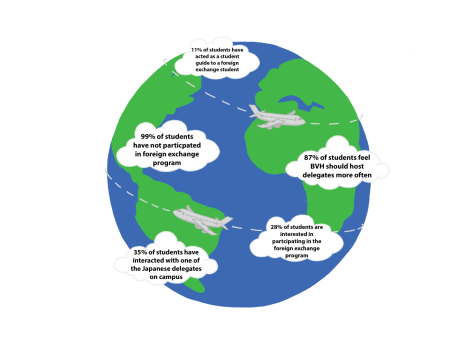
IB Spanish and French teacher Marina Dillingham visited France with IB French teacher Patrick Beaulieu. Dillingham also visited Spain with Spanish 1-2, 3-4, and 5-6 teacher Lilia Meza. She stated that the trip is advertised in the lower-level language classes however, the trip can only be attended by higher-level language students, signaling a sense of commitment to the program. The exchange program involves a student trade between the school in the foreign country and BVH. The students going to the foreign country are expected to host foreign students when they visit the foreign country school and vice versa.
The last student exchange was done in the fall of 2019; BVH french students visited France and were preparing for the arrival of French students in spring, 2020. Although, before the French students could visit, the pandemic began and the program was put on hiatus until further notice.
“I got a phone call saying that France had canceled all student trips abroad, so [the students from France] weren’t coming and everybody was in tears,” Dillingham said. “We had everything, and we were ready. They were arriving Monday morning, so it was a huge disappointment and let down to everyone. A week later, our school shut down.”
The process that ensued for that trip to France was a long one, as it is often the language teachers that organize such trips. A pile of paperwork from the Sweetwater Union High School District (SUHSD)—that Pirazzini deems a “nightmare”—unpaid hours and coordination with the international school is only a few of the time-consuming tasks teachers complete.
Beaulieu listed activities that come with being the organizer of these exchanges such as finding host families, buying plane tickets and insurance, informing students and parents, and organizing activities to do when the foreign exchange students arrive. Supporting these endeavors has become costly so SUHSD has “dialed back” their support and is not “as generous as they had been in the past,” according to Beaulieu. With all the conditions and extra liability the district has given, the language teachers agree that SUHSD offers little to no help in the process of organizing the exchange.
“The district is always talking about equity. You can talk about equity, but until you show equity in all your programs, I don’t think it’s really…worthwhile,” Beaulieu said.
Aside from the mutual language exchange opportunities offered to students, BVH often sees foreign delegates visiting the campus. Most recently, the soon-to-leave Japanese delegates and Chinese delegates two years ago were brought to BVH through the EduAbroad program.
EduAbroad is offered to international foreign students from kindergarten all the way to the college level. It prioritizes placing foreign students in San Diego but has agreements with other schools across the country. EduAbroad has been working with SUHSD and its schools since 2016 and, like the language class exchange program, had to halt its program during the pandemic.
“I wanted to help students have a study abroad experience. Originally, I did it as a hobby but little by little it became a job. It’s not a one-person job, it is a whole team’s effort,” EduAbroad Founder and President Hiromi Shimamura said.
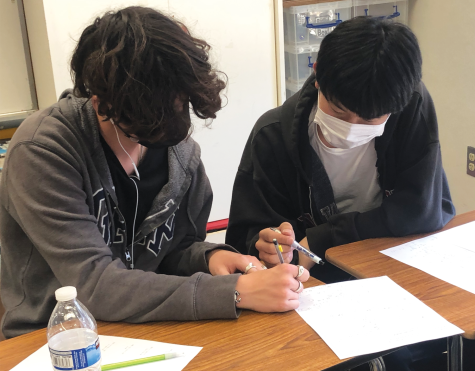
BVH is only one of the many schools that work with EduAbroad as they average the exchange of approximately 1,000 students every year, according to Shimamura. Large groups of foreign students are split into smaller groups and placed in different schools across SUHSD. Larger groups of delegates tend to have shorter stays while smaller groups, such as the Japanese delegates, stay for extended periods of time. The “buddy system” that EduAbroad uses places a delegate with an ‘ambassador’, usually a student who volunteers to guide the delegate around the school.
Despite having 500 host families in San Diego, finding hosts is one of the more difficult aspects of the program. According to Shimamura, this obstacle then affects which school the delegate will be assigned to. To find host families, EduAbroad regularly goes to school events around SUHSD to meet with families willing to host foreign delegates. Background checks are extremely common for any family that wants to host a foreign delegate to ensure their safety.
“In one school, the parents called me and said ‘my son was not chosen to be an ambassador but he cried because he really wanted to be [one]. There’s [just] so many students to choose from’,” Shimamura said. “Instead he had asked his father if he could host. I was so touched when the father told us that, I thought it was a great idea that the son took the initiative to share that idea.”
Shimamura actively tries to get families to host students as it will be a good experience for the delegates and for the host family. EduAbroad is responsible for all its delegates as soon as they arrive in San Diego and—depending on the duration of the delegates’ stay—drafts weekly to monthly reports for the delegates’ families. EduAbroad often uses photos provided by the host family and letters from the delegate who talks of any obstacles they’re facing or of their fun experiences.
Pirazzini shares that both programs have a core belief about the students’ trip—that it is an “invaluable experience.” Both Shimamura and Beaulieu experienced life-changing cross-cultural experiences that led them to their eventual professions as foreign language teachers. Shimamura migrated to the United States when she was young and had to adapt to a new society and culture, while Beaulieu visited Mexico through an exchange program that “changed [his] life”.
“We do [the exchange program] because when we are there, the experience is so incredible. It’s so powerful for ourselves as educators to be able to experience the education system in another country,” Dillingham said. “For the students, it’s the relationships they build while we’re there with their French host, with their host friends, and with the host families.”
Student experiences
Vanessa Ramirez
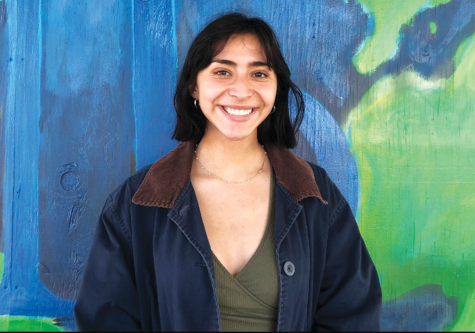
Vanessa Ramirez is a senior at Bonita Vista High (BVH) and is one of 11 students to participate in the French Exchange Program at BVH. The program entails studying abroad in countries like France in an effort to immerse students in both the language and culture. Ramirez was eligible for the program because she took three years of French.
Ramirez visited Lille, France for two weeks in 2019 during her sophomore year. She felt that she was well-versed enough in the language and had enough knowledge to practice with French natives. She explained that the people were kind, though “there was a complete shift in attitude because they could tell we [the students] were Americans.”
Ramirez spent her first day in Paris exploring the city alongside Chula Vista High School’s French students. Because Paris is a small city, Ramirez had the opportunity to visit famous landmarks such as the Champs de Elysees, Louvre, Notre Dame, La Seine, Eiffel Tower and other places.
Ramirez lived with her correspondent’s small family. She mentioned that the architecture of their home stood out to her, describing it as ‘modern’ and the home itself was filled with lots of decorations made by French artists.
“Here [in America] we have our homes built in the 90s or 2000s and there [in France] the architecture was modern. Townhome living looked very modern,” Ramirez said.
Additionally, she described Lille as suburban, in which the area was surrounded by nature. Ramirez explained that Lille is similar to San Diego, as they both have suburban areas within its small city.
“[Lille] is smaller than most cities. There are communities with homes among shops in towns,” Ramirez said. “There’s a lot of farm life; they make their own bread in Lille, they have their own milk. It was suburban but more [on the] countryside.”
As for school, she attended Institut de Genech, a high school that specializes in agriculture. Though she was not interested in the agricultural aspect of school, Ramirez found the overall high school experience in France interesting. A difference Ramirez found when comparing schools in California to schools in France was that most of them are vocational in the sense that they have classes that prepare students for specific careers.
“I thought it was really interesting how [in] high school, there are job opportunities. They prepare you for the future immediately,” Ramirez said.
During her stay, Ramirez experienced the stigma against the attitude of French people. She expressed that in Paris, the people were “rude once they found out you were American, they would give you glares or roll their eyes at you.” Outside of Paris, however, “they were extremely sweet. I had friends [from the U.S] that hardly spoke French and their correspondent was so sweet and helpful.”
She revealed her experience was a cultural shock, specifically her experience with the French interpretation of American food as greasy.
“They made me a burger, but it was almost like a filet mignon type of cut. It was red, or medium-rare. I thought that was really interesting,” Ramirez said.
Additionally, she found French customs to be fascinating. In comparison to America, greetings, table manners and the culture of going out in France were vastly different. “Here in the states, we’re not touchy. Every time you greet in France, you give two kisses on the cheek.” Ramirez said.
On the third day, the realization of being in France for two weeks overwhelmed her. She expressed that although she had many fun memories in France, she felt homesick. To cope with homesickness, she would call her mom and tell her that she misses the family back home.
“She [Ramirez’s mom] would reassure me that everything’s good and [that] I’m going to be fine [which] helped me,” Ramirez said.
Reflecting on her trip abroad, Ramirez believes that the foreign exchange program was a valuable experience. She expressed that it was a great way to learn the French language and immerse herself in the culture.
“It’s extremely helpful. I learned way more French when I was there because they [French people] kept telling me ‘oh, these are the tenses you’re supposed to use,’ it re-instilled [the language] in me,” Ramirez said. “It’s also a really fun experience to get out there and experience a different country and their culture.”
Yosuke Hashimoto
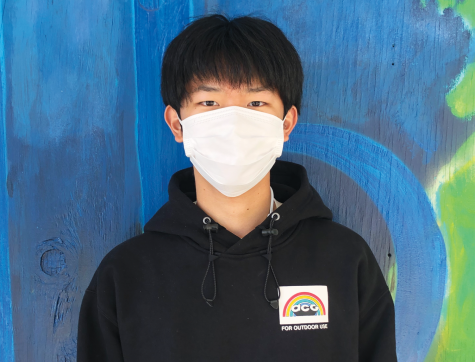
Yosuke Hashimoto is one of five Japanese Delegates that were chosen for a foreign exchange program to study at Bonita Vista High (BVH). He is a ninth-grade student who attends Meisei Junior High School (MHS) in Osaka, Japan.
Out of 30 interested MHS students, Hashimoto was the only student from his school to participate in the foreign exchange program at BVH. He expressed an interest in becoming a delegate, wanting “to leave [his] parents and become independent.”
According to Hashimoto, the process of becoming a delegate involved an interview where he was asked various questions and the interviewer checked his English language skills. As one of the chosen students, Hashimoto shared a feeling of accomplishment.
“I’m proud of myself. There’s a lot of people who wanted to go,” Hashimoto said.
The foreign exchange program allowed for Hashimoto’s stay at BVH and marked his first time in America. He feels as though his English skills have already improved during the time he has stayed in the country.
Throughout his fourth and sixth grade years, Hashimoto lived in Cairns, Australia due to his father’s job at a cardboard-making company. He initially thought that he was going to stay in Australia until he reached high school. However, his father had told him otherwise and in grade seven, Hashimoto returned to his hometown in Osaka.
“My father told us we [were] going to move back [to Japan]. I had to study hard [because] Japanese junior high school exams are pretty tough and I couldn’t speak Japanese fluently,” Hashimoto said.
Outside of MHS, Hashimoto takes part in several extracurricular activities. He works alongside his neighbor to teach kids English, mentioning “it’s fun when kids understand what I’m saying”. He also plays shortstop in his school’s baseball team and enjoys listening to music in his free time, recommending the Japanese band ‘Saucy Dog.’
“I’ve played [baseball] for 6 years. I learned how teamwork and mental strength are important to a community. I started playing because most Japanese boys like baseball,” Hashimoto laughs.
The Japanese schooling system differs greatly compared to the system present in America. Hashimoto points out significant differences as he explains that his school requires students to wear uniforms and is ‘special’ as an all-boys school. Hashimoto’s schedule for MHS is determined by his teachers and he remains in one class throughout the school day. In contrast to BVH, where students usually rotate and move to their six class periods daily. Hashimoto’s school days begin at 8:40 am and last until 4:10 pm, any club activities usually end at 6:00 pm.
“Usually students can’t choose which class(es) they take,” Hashimoto said. “The students are divided [into] groups of 40 and are always in the classroom.”
Upon his arrival at BVH, Hashimoto found that the school provided a ‘fresh’ feel. “There’s a lot of diverse backgrounds [at BVH]. In Japan, most people are Japanese. But in America, it’s totally different,” Hashimoto said.
Hashimoto expressed positive emotions of happiness as a result of the friendliness he has experienced from the students at BVH. He says that he has made many friends, believing to have connections to the global scholar students he was paired with. Nevertheless, Hashimoto still faces the challenge of expressing himself to his peers.
“Communicating is difficult. Sometimes I [don’t know] what I want to say in English,” Hashimoto said.
Despite this, Hashimoto has discovered a newfound interest in studying in America after graduating high school. In January, he visited San Diego State University and the University of California San Diego with his host parents. He wanted to visit these schools to see how different universities in America are from Japan, pointing out how big the schools are in comparison. He mentions that if he is given the opportunity, he will study at an American college.
“My most valuable experience [in America] was [seeing] diverse environments so that I could understand [people’s] backgrounds and values; anything that is different to me,” Hashimoto said.
